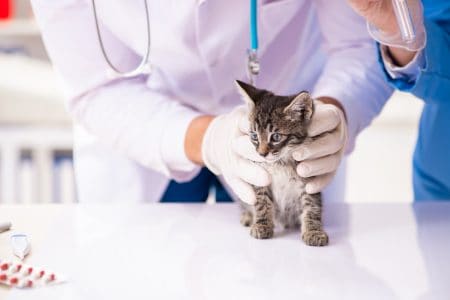Why is preventative care so important?
Pre•ven•tive
- Designed to keep something undesirable such as illness, harm, or accidents from occurring.

- A medicine or other treatment designed to stop disease or ill health from occurring.
The Importance of an Annual Physical Exam…
- The importance of an annual physical examination is the same for your pet as it is for you. Maybe even more so: dogs and cats age 4 to 7 times faster than human beings, so for a cat or dog to have an annual physical exam is like us going to see the doctor once every 4 to 7 years. A lot can happen in that period of time.
- During each Preventive Care Exam we evaluate 16 body systems, looking for changes that would be difficult for most pet owners to detect, such as heart murmurs, abdominal masses and dental problems.
- Being proactive is less costly than being reactive. Let’s don’t wait for your pet to get sick and then react. Let’s prevent the illness in the first place
Lab work
The history and physical exam are the most important aspects of patient monitoring and diagnosis, but lab work gives us information that we cannot otherwise detect. The physical exam is the external evaluation and the lab work is the internal evaluation. Even in the apparently healthy pet, diseases may be in the early stages and they cannot be recognized without appropriate lab tests. Some of the most common tests that may be performed are checking a stool sample for parasites, examining the urine, and blood tests for heartworm disease, chemistry profiles, and Complete Blood Count (CBC).
- Intestinal Parasite Exam – a fecal floatation is recommended at least annually on every adult pet to screen for intestinal parasites such as hookworm, roundworm, whipworm and tapeworm. These parasites are common in our subtropical environment. A separate test should be run on each individual pet. Random samples from the yard or a litter box are not optimal.
- Heartworm exam – for dogs, an annual heartworm blood test is required to monitor for the presence of heartworms. Heartworm is very prevalent in this area, and even though prevention is safe, convenient and economical, nothing is 100% effective. If your dog is infected with heartworms, we want to catch it early so they can be eliminated before they cause permanent damage.
- Early Detection Profiles (EDP)- these consist of intestinal parasite exam, a CBC and a limited chemistry profile. For dogs it includes the heartworm exam and for cats it includes a thyroid test (thyroid disease is common in cats.) This profile can help us pick up diseases in the early stages, and if normal it gives us a baseline with which to compare in the future. When we do these annually, we can also spot trends that warn us of a problem in the future, allowing us to take preventive steps now. The EDP can also be part of a drug monitoring profile (see below) or can serve as pre-anesthetic lab work for patients who need anesthetic procedures done within the next month.
- Comprehensive Lab Profiles– these are more extensive series of tests, including a urinalysis and full chemistry profile that are always recommended for senior pets, but can be done on younger adults as well if circumstances warrant.
- Chronic medication monitoring– this includes annual blood level testing for drugs such as Thyroid tabs, Phenobarbital and Potassium Bromide. One of the profiles listed above will be needed for patients taking drugs like NSAIDs.
Other things you can do
- Keep your pet’s teeth and gums healthy. By using effective dental treats, and having professional dental cleanings done when indicated, we can save teeth and prevent them from rotting out, as well as control infections that start in the mouth
- Maintain your pet at an ideal body weight. Lean dogs and cats live longer.
- Consider pet health insurance. This is a financial preventive measure that may make it possible for your pet to receive the treatment it needs if it should become sick or injured.
- Call us for an appointment to have your pet examined and let’s work together to provide your pet with the preventive care it needs.
